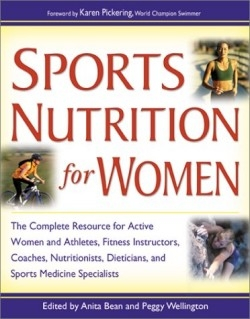Sports Nutrition for Women
Did you know that the daily diet for a woman athlete should be made up of at least 60% carbohydrates? For a woman consuming 3,000 calories a day, that translates to 450 grams, which is the equivalent of “30 bananas, 12 large potatoes, or 10 chocolate bars.”
With the popularity of low-carbohydrate diet books, this fact may seem surprising. However, in order to perform well, women athletes need the extra energy that carbohydrates provide. In addition to such diet information, this book covers nutrition in pregnancy, health issues, menstruation, losing weight, eating disorders, and other critical topics. In order to stay healthy, the book advises women to recognize their nutritional requirements and adjust according to their individual physical conditions.
The book is full of interesting facts like these: after pregnancy, women are only supposed to gain three to four pounds and are not necessarily “fat for life”; an athlete should eat five or six meals or snacks per day; and twenty to thirty percent of an athlete’s diet should be made up of fat.
The authors, Anita Bean, a fitness instructor and 1991 British Bodybuilding Champion, and Peggy Wellington, a sports nutritionist who advised the 1992 Barcelona Olympic Games, translate scientific information into charts, figures, and drawings. Several other experts contribute chapters. The writing styles are clear, even when scientific terms are used. A glossary of terms would have further aided readers.
Reading this book may feel like reading several different books jumbled together. Sometimes the progression from one chapter to the next is awkward. However, the book is a complete resource in one volume. The reader obtains a broad perspective on sports nutrition and women’s health through the independently developed, disparate topics.
The layout of the book is reminiscent of a high school health textbook, with its bold paragraph headings and its “practical points” summaries at the end of each chapter. Many of the headings are set up as questions that readers may ask their physician or physical trainer-a very effective tool in presenting scientific information in lay terms. The bibliographies that appear at the end of almost every chapter will be appreciated for further research and clarification. The recipes and sample eating plans are a practical and useful addition, but the authors could have included more of them.
This wide-ranging resource on women sports nutrition should be added to every active woman’s bookcase.
Reviewed by
Colleen Lougen
Disclosure: This article is not an endorsement, but a review. The publisher of this book provided free copies of the book to have their book reviewed by a professional reviewer. No fee was paid by the publisher for this review. Foreword Reviews only recommends books that we love. Foreword Magazine, Inc. is disclosing this in accordance with the Federal Trade Commission’s 16 CFR, Part 255.

